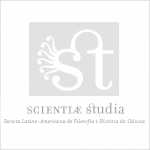Haeckel e Nietzsche: aspectos da crítica ao mecanicismo no século XIX
Vol. 1, No. 4 • Scientiae Studia
Autor: Wilson Antonio Frezzatti Jr.
Resumo:
O mecanicismo não constitui um corpo único de idéias, pois pode se apresentar sob várias perspectivas. Os pensamentos biológicos do século XIX formam um bom exemplo da diversidade das abordagens mecanicistas. Dessa forma, devem-se evitar investigações em que conceitos genéricos fundamentem o estudo de teorias biológicas: cada teoria deve ser entendida em sua própria trama conceitual. Ernst Haeckel, biólogo alemão, constrói, por meio de um mecanicismo físico-químico, uma filosofia monista em que os processos vitais são casos especiais de leis universais. A construção dessa filosofia envolve uma crítica do mecanicismo de contato. Friedrich Nietzsche, filósofo alemão, baseado na mecânica do desenvolvimento do neo-lamarckista Wilhelm Roux, desenvolve uma explicação da vida que dispensa tanto o mecanicismo quanto concepções teleológicas: a saber, a luta de impulsos ou forças por mais potência (vontade de potência). Tais exemplos mostram a interdependência, na biologia do século XIX, entre ciência e filosofia e a importância do estudo do pensamento dos autores que participaram desse processo histórico.
Abstract:
Mechanicism does not constitute a single set of ideas, for it can present itself through several perspectives. Biological thinking from the nineteenth century constitutes a good example of the diversity of mechanistic approaches. Thus, investigations in which the study of biological theories is based on generic concepts should be avoided: each theory should be understood in terms of its own conceptual fabric. The German biologist Ernst Haeckel elaborates a monist philosophy by means of a physical-chemical mechanicism in which the vital processes are special cases of universal laws. The construction of this philosophy involves a criticism of the traditional contact-based mechanicism. The German philosopher Friedrich Nietzsche, based on Wilhelm Roux's neo-Lamarckist mechanics of development, develops an explanation of life that dispenses both with mechanicism and with teleological conceptions, namely, the struggle of impulses or forces for more power (will to power). Such examples show the interdependence between science and philosophy in nineteenth century biology, and the importance of studying the thought of the authors who took part in this historical process.
DOI: http://dx.doi.org/10.1590/S1678-31662003000400003
Texto Completo: http://www.scielo.br/scielo.php?script=sci_arttext&pid=S1678-31662003000400003&lng=pt&nrm=iso&tlng=pt
Palavras-Chave: Mecanicismo,Biologia,Haeckel,Nietzsche,Monism

Scientiae Studia
Associação Filosófica Scientiae Studia - Revista Scientiae Studia
